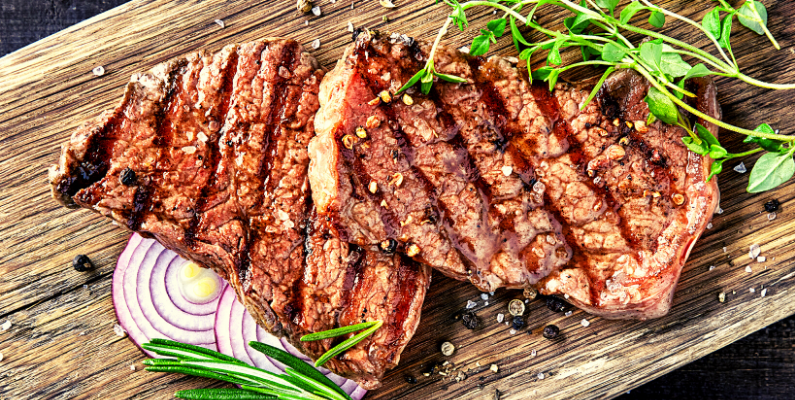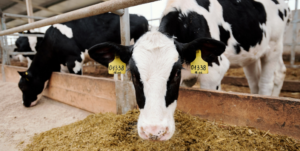Meat-packing industry: requirements for the success of livestock activity
31 de March de 2022
Tempo de Leitura: 11 minutos
The meat-packing industry is one of the most important businesses for the Brazilian economy. With a big production volume, we meet domestic and international demands efficiently. After all, we are major players in the animal protein segment.
There are large Brazilian meat-packing multinational companies on the stock exchange, which is proof of such influence. The Ibovespa, the main performance indicator of the Brazilian stock exchange, or B3, has four meat-packing industries in its portfolio, BRF (BRFS3), JBS (JBSS3), Marfrig (MRFG3), and Minerva (BEEF3).
The Brazilian meat-packing business has shown great resilience to the economic impacts of the pandemic, performing pretty well even in face of the global crisis experienced in the last two years.
However, in order to meet the demands put forward by the consumer market, there is a need to bolster constant improvement in the structuring of the entire beef chain.
Everyone has their share of responsibility for such growth. For instance, the meat processors need to heavily invest in quality, mainly to meet global socio-environmental compliance guidelines, with specific regulations that ensure compliance with all standards, while also pursuing maximum productivity and profitability.
Therefore, it is essential to have technological tools that allow the analysis of production systems that aid the meat-packing industry to improve how its suppliers are managed, especially regarding the characteristics of the production area. All these elements allow for increased operational efficiency.
Hence, we are going to show you how the Brazilian meat-packing industry is arranged and help you understand the importance of adopting tools that help meat-packers to better manage this process.
Livestock production: Great influence in the Brazilian agribusiness
The last two years have been challenging for the world economy. In Brazil, on one hand, many challenges have been imposed on our economy, such as the pandemic, rising interest rates, economic recession, social isolation, and so on.
On the other hand, even though the Brazilian beef cattle was affected by it all, it has shown a lot of resilience, representing about 10% of Brazilian agribusiness GDP (BRL 747 billion) in 2020, according to Data from the Beef The Brazilian Livestock Profile – 2021.
There is a herd of 187.55 million heads in Brazilian cattle ranches, with a registered slaughter of 41.5 million heads. In the same period, the Brazilian meat-packing industry recorded an 8% increase in beef exports, which rose from 2.49 million CET (Common External Tariff) in 2019 to 2.69 million CET in 2020.
This increase in exports was due to the rise in the number of destination countries (from 154 to 157 countries) and the rise in the volume intended for already consolidated markets. A clear example is China, to where the exported volume increased by 127% between 2019 and 2020.
The trend is for the industry to experience a cycle of prosperity, with improvement in genetics, cattle feed, and logistics in the upcoming years. There is a growing strengthening in the use of technologies such as Fixed time Artificial Insemination (FTAI) that, through genetic improvement, also makes the herd more sustainable, as it promotes sexual precocity and increased feed efficiency. In feeding, for example, the efficient management of pastures, increased mineral supplementation and even greater efficiency of confined cattle will play major roles.
When it comes to logistics, there will be a recurring need for increasingly appropriate vehicles, both for transporting cattle to the meat processors, and meat to the consumer market. However, given the potential of the industry, we can observe a very large and well-founded growth.
In other words, the agribusiness sector presents great chances for a thriving development.
Brazilian livestock: Prosperous, but requiring targeted care
As with all agribusiness, the Brazilian meat chain has great potential, with a trend towards excellent numbers in the coming years. Yet, for these numbers to become a reality, it is up to the sector to prioritize the maximum quality of the entire production chain.
As previously mentioned, meat processors must adopt solutions that allow better management of supplier farms. As a result, they will obtain many benefits, such as avoiding doing business with producers and livestock companies that do not comply with Brazilian environmental legislation, such as the Brazilian Forest Code, and thus will be able to export to consumer markets that require better traceability and socio-environmental compliance with the rules of the countries of origin and destination regarding products of animal origin.
Thus, in order to promote the expansion of the agricultural industry and environmental regularization, the livestock industry should focus on the development of livestock in different biomes in the long term, but at the same time, it should catalog necessary actions to implement intensification.
The intensification of livestock production and care for the environment brings several benefits to the entire meat value chain, among which it is worth mentioning:
- Increase in farm productivity and profitability;
- Land appreciation;
- Improved carcass standardization;
- Increase in the supply of animals for slaughter;
- Improved food quality;
- Greater ability to fight the informal meat market, ensuring food safety within the market;
- Possibility of price differentiation;
- Reduction of greenhouse gas emissions.
In addition, for the growth of the meat chain trend to be confirmed, it is also essential to invest in measures that allow the tracking of the meat chain, from the feed offered to cattle to the meat offered to the consumer market.
Traceability in livestock activity: awareness of what happens from farm to table!
In the current world situation, the ‘from farm to table” concept has been disseminated year after year. This concept aims to introduce the consumer to the entire journey taken by the food to reach their dinner table.
This is due to consumers’ increasing demand for a better quality of the food they buy. Being aware of the origin of what is on their plate is paramount and it is a criterion for choosing among the alternatives available on the market.
But there is great complexity involved in this process. In the livestock industry, there are many steps to be taken along the way. Therefore, having a tracking system is essential. It provides accurate information about herd and farm characteristics.
Among many advantages, traceability within the meat chain is a measure that guarantees the cattle breeder to comply with the law and not show any irregularity in national and international trade.
Traceability is also a measure that may inform both farm owners and feedstock buyers and suppliers about the distribution of products and their byproducts, from pasture to plate.
Furthermore, the traceability of the entire chain is a tool able to identify those responsible for deforestation and other environmental and social crimes of farmers who carry out their production systems without converting native areas into pastures.
Meat traceability also offers many opportunities to the sector, mainly in the following aspects:
- Large buyers are pushing for traceability. In other words, the farm that does not adopt it may lose market opportunities;
- Greater pressure for the incorporation of new sustainable technologies on farms;
- New chain arrangements are factors that may stimulate traceability;
- There are financial incentives for sustainable livestock, such as the ABC Plan in Brazil, which requires the adoption of traceability;
- Traceability gives access to markets with higher added value, that is, they pay more for the product.
Traceability and the issue of sustainability: the direct link
Given the influence of the Brazilian meat-packing industry worldwide, the strategic role of the entire meat chain for environmental conservation and the guarantee of human rights and of traditional communities and indigenous peoples is notorious.
Every individual who works in the area knows that Brazilian livestock is mostly carried out on pasture and therefore it depends on natural resources and climate balance, in addition to being part of the culture of several regions.
It all requires total control over everything that happens with the production system and part of the solution is closely related to the search for traceability of the entire Brazilian meat chain.
But did you know that the meat-packing business has a great responsibility in it?
As buyers, all meat-packers must demand the adoption of some sustainable rules from their suppliers, such as sustainable production and environmental protection of preserved areas.
Meat processors must also monitor supplier farms that are in the Legal Amazon, signing the Terms of Adjustment of Conduct (TAC) for cattle ranching, which are agreements signed between meat processors and the Federal Prosecution Service (MPF). TAC’s goal is to avoid the purchasing of animals from farms that are proven to be associated with illegal deforestation, in addition to evaluating other socio-environmental criteria.
However, having monitoring and traceability tools that allow such management becomes essential on the part of the meat processors in order to reach these goals. Faced with new challenges, such as the practice known as “cattle washing”, which consists of tampering with the origin of cattle, from a “dirty” property, with socio-environmental irregularities, to a “clean” one, in socio-environmental compliance. In addition to traceability, it is necessary to continuously make a socio-environmental assessment of direct and indirect suppliers, which is one of the solutions provided by Agrotools.
When the meat processor chooses a tool that allows for a more agile and digital management of the chain, it will have greater support for decision-making, allowing for a much more competitive operation.
There are already modern tools for this purpose, such as the Socio-environmental Analysis Pixel, by Agrotools. This Pixel helps meat-packers to identify socio-environmental compliance, crossing information from territories and the producer with deforested areas, indigenous lands, embargoed areas, conservation units, and other information of interest to compliance.
This platform relies on artificial intelligence to be able to strategically monitor and map all processes, from the purchase of cattle from the farm to the management and logistics of suppliers.
These tools work as a consultative solution that takes into account the features of rules and policies, and the identification of regions for the meat-packing business in order to optimize the processes of purchasing raw materials from rural producers.
There are also other solutions developed by Agrotools, which allow data collection in the field, geographically mapping the area, helping to identify new suppliers and enabling the optimization of raw material purchase routes.
Gix, for example, is an application that makes all the difference when it comes to collecting information in the field. It can be used to digitize the data collected during on-site inspections and make processes more practical and efficient.
A great advantage of Gix is that the application works offline at the time of collection, which is essential for those regions without internet access.
Therefore, when meat processors adopt a system that allows tracking and monitoring of livestock supplying farms, they will get the following benefits throughout the meat chain:
1.) Adoption of public policies based on sustainable development
Among other actions, traceability allows one to identify when it is necessary to comply with environmental and land tenure regularization, thus driving public policies.
2.) Identification of the meat-processing supply chain
This measure helps to identify and segregate farms that are related to deforestation, violate embargoes, invade lands, are linked to slavery, and are not in compliance with the guidelines of the meat processors.
3.) Guarantee of origin (certification)
Finally, the adoption of monitoring ensures that buyers (meat processors) will have knowledge and information about the origin of the meat and the traceability assigned to it.
As a result, there is significant brand protection, in addition to reputational shielding for those who directly or indirectly buy agricultural raw materials.
Therefore, Agrotools offers solutions for brand protection, which makes 100% of the monitoring of its supply chain digital, from the field to retail, and thus ensures compliance with socio-environmental legislation and mitigates the risks that can cause damage to the name of your company.
4.) Compliance with the ESG agenda
Nowadays, the consumer market is very concerned with issues related to sustainability. Therefore, ESG becomes greatly important, requiring full compliance. A good tool will facilitate this.
If you are the manager of a meat-packing company, operate in the retail market, or are part of the meat chain, you should invest in a tool that allows for the optimization of your purchase process. Therefore, you will be sure to acquire a high-quality product that meets all legal requirements regarding sustainability.
That is, these tools make it a win-win situation, especially regarding agility in the process!
Take advantage of the importance of traceability and learn in a few clicks about the 100% digital tools that allow analysis and monitoring of territories offered by Agrotools.
Make the management of your origination in the field more agile and 100% digital.
With the Agrotools technology, you have easy access to detailed data from all your suppliers in the palm of your hand.
Increase your bargaining power and feel the evolution in the results!








